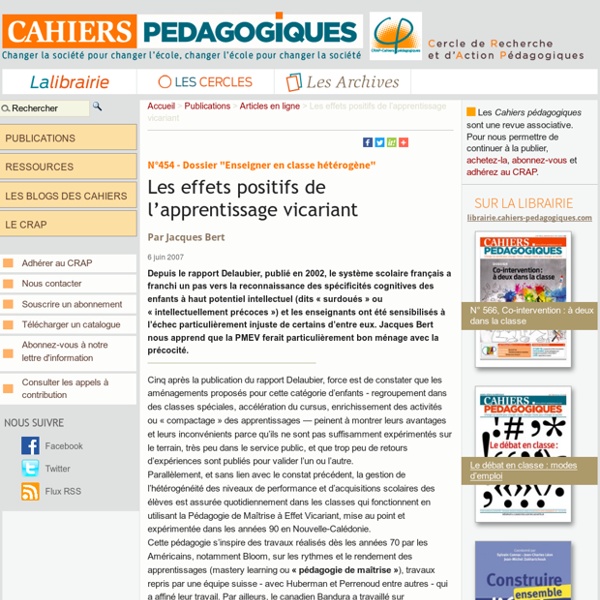Fondements sociaux de la pensée et de l'action chez Bandura
Bandura base sa théorie sur la notion d’interaction. « Selon cette conception transactionnelle du soi et de la société, les facteurs personnels internes – sous forme d’événements cognitifs, émotionnels et biologiques –, les comportements et l’environnement opèrent tous comme des facteurs en interaction qui s’influencent réciproquement » (Énoncé 1) (Bandura, 2003, p. 16). Le principe est posé que l’environnement (social en particulier) influence la personne, qu’il est susceptible d’affecter ses représentations et croyances. Par exemple, l’observation d’un modèle peut avoir une incidence sur l’autoévaluation de ses propres capacités. L’exposition à des messages publicitaires présentant une vision débilitante des personnes âgées et l’intériorisation de cette vision induit éventuellement ce même type d’effet sur les seniors. Dans ce dernier exemple, il est assez clair que c’est l’influence de la culture occidentale marchande qui joue sur la personne.
Numéros spéciaux | SavoirsSavoirs
Hors série 2004Autour de l’œuvre d’Albert Bandura Table des matières :Philippe Carré - Bandura : une psychologie pour le XXIe siècle ?Pierre-Henri François - Fondements sociaux de la pensée et de l’action chez BanduraJacques Lecomte - Les applications du sentiment d’efficacité personnelleBenoît Galand, Marie Vanlede - Le sentiment d’efficacité personnelle dans l’apprentissage et la formation : quel rôle joue-t-il ? D’où vient-il ? Comment intervenir ?Thierry Meyer, Jean-François Verlhiac - Auto-efficacité : quelle contribution aux modèles de prédiction de l’exposition aux risques et de la préservation de la santé ? Albert Bandura, l’un des plus célèbres psychologues américains, est au fondement du courant sociocognitiviste. Dans ce numéro hors-série, onze auteurs présentent l’œuvre d’Albert Bandura et commentent la théorie sociocognitive qu’il a développée et affinée depuis trente ans. Résumés des articles _________________________________________ Applications of self-efficacy Haut de page
L'individuel et le social dans la théorie sociocognitive de Bandura (Carré, 2003
La réciprocité causale « triadique » Traditionnellement, le comportement humain est expliqué à travers un système de causalité binaire, unidirectionnel. Les conduites sont généralement vues comme étant sous l’emprise de forces de la situation (par exemple avec le behaviorisme) ou pilotées par des dispositions internes inconscientes (comme en psychanalyse ou dans certaines conceptions sociologiques). Dans la TSC, le fonctionnement psychologique est analysé à travers une causalité réciproque triple, à travers un modèle dit « triadique ». L’environnement imposé recouvre des circonstances sur lesquelles les sujets ont peu, ou aucune prise, comme une grève de transports en commun, un licenciement ou le climat du jour. La relation PC “ personne-comportement ” (1) (2) [...] La relation EP « environnement – personne » (3) (4) [...] La relation E - C « environnement-comportement » (5), (6) L’individuel et le social dans la théorie sociocognitive
Carol Dweck
Un article de Wikipédia, l'encyclopédie libre. Carol S. Dweck (née le 17 octobre 1946) est professeur de psychologie sociale à l'Université Stanford[1]. Contributions[modifier | modifier le code] Les intérêts de recherche principaux de Carol Dweck concernent la motivation[2],[3],[4], la personnalité, et le développement. Sa principale contribution à la psychologie sociale réside dans les théories implicites de l'intelligence. C'est important car (1) les individus avec une théorie "de développement" sont plus susceptibles de continuer à travailler dur en dépit des revers et (2) les théories de l'intelligence des individus peuvent être affectées par des indices environnementaux subtils. Quelques-unes de ses publications[modifier | modifier le code] (fr) Dweck, C. Sources[modifier | modifier le code] Notes et références[modifier | modifier le code]
Traité de psychologie positive
Les chercheurs et praticiens les plus reconnus à l’échelle internationale proposent dans cet ouvrage une synthèse particulièrement exhaustive et détaillée des différentes thématiques objets de la Psychologie Positive. Après avoir retracé les origines et fondements théoriques de la discipline, les auteurs dressent un état des lieux des connaissances actuelles relatives aux concepts de bien-être, de bonheur, d’états de grâce, d’optimisme, de pessimisme, de motivation ou encore du rôle de l’activité physique.La complémentarité des domaines abordés offre un panorama complet de la Psychologie Positive et met en évidence la nature de l’impact de ces facteurs sur un ensemble de variables comportementales, affectives et cognitives.La force de l’ouvrage est de présenter un équilibre entre les fondements théoriques et les implications pratiques qu’il est possible d’en tirer. La Psychologie Positive, à l’instar d’autres courants de la psychologie, propose différentes modalités d’intervention.
Le dispositif d'autoformation et le rôle de tuteur
1.3.3.3.1. L’apprentissage autodirigé, les problèmes psychologiques. Comparé à l’individu en formation « classique », l’apprenant en autoformation est davantage exposé à la « solitude » François (2002), devant les difficultés de choix, gestion et contrôle. Il doit constamment faire face aux sentiments de doute et/ou de satisfaction qui déclenchent et maintiennent les comportements d’autoformation. ‘«’ ‘ L’élément critique de l’apprentissage autodirigé ne réside ni dans la variable sociologique, ni dans le facteur pédagogique : la distinction principale est la variable psychologique, c’est-à-dire le degré auquel l’apprenant, ou le ’ ‘«’ ‘ soi ’ ‘»’ ‘ garde un contrôle actif du processus d’apprentissage ’ ‘»’ (Long, dans Carré et Moisan et al, 2003, p.25). L’autodétermination : renvoie « au choix et au « contrôle sur le sens, l’intentionnalité de l’action (registre de la motivation, du choix, du projet) ». Figure 5 : modèle d’autorégulation de B-J.
Concept du socio-constructivisme - Rp70110
CONSTRUCTIVISME ou SOCIO-CONSTRUCTIVISME ? Depuis 1978, les recherches sur la notion de conceptions préalables ou représentations initiales permettent aujourd'hui de distinguer trois grandes positions en éducation: Cette pédagogie, appelée "magistrale" ou "frontale" s'inspire des travaux de John Locke. La connaissance transmise par l'enseignant viendrait s'imprimer dans la tête de l'élève comme dans de la cire molle. Cette théorie, appelée béhaviotrisme, prend appui sur les travaux de Thorndike, Pavlov, Skinner et Watson. L'apprentissage résulte d'une suite de conditionnements "stimulus-réponse". Le constructivisme Le nouveau savoir n'est effectif que s'il est reconstruit pour s'intégrer au réseau conceptuel de l'apprenant. C'est l'élève qui apprend et personne ne peut le faire à sa place. Le socio-constructivisme La construction d'un savoir bien que personnelle s'effectue dans un cadre social. Interdépendance de l'apprentissage et de son contexte Le conflit sociocognitif La métacognition



